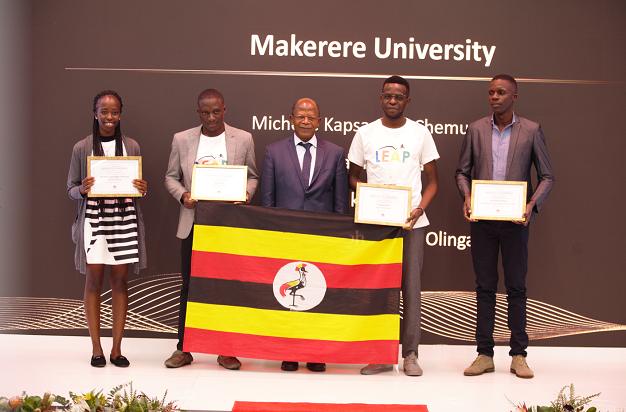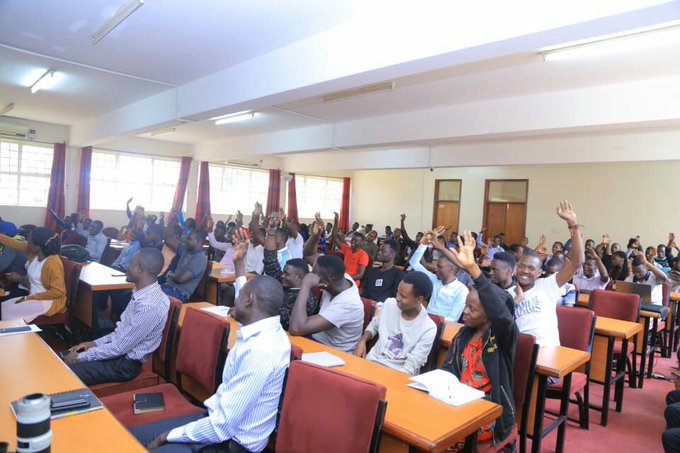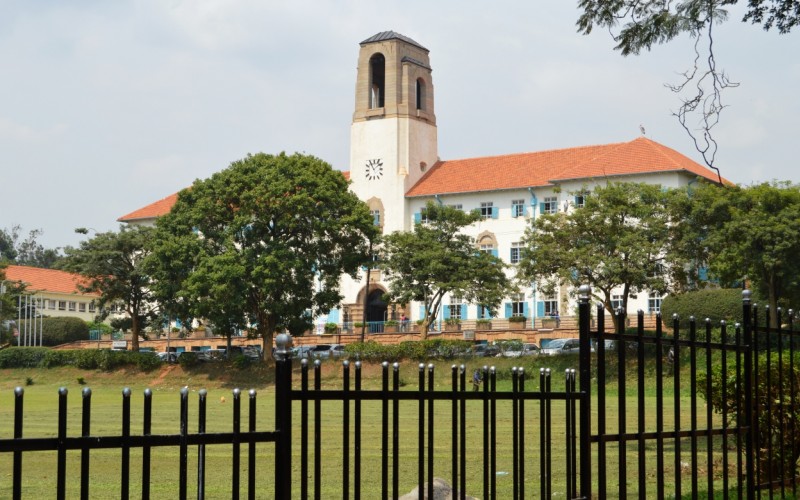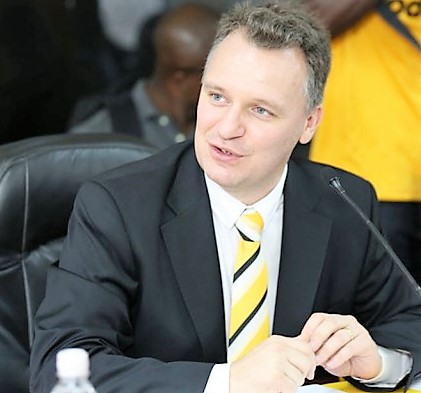Team Uganda with the State Minister for Higher Education Hon. Dr JC Muyingo
The state minister for higher education Hon. Dr. JC Muyingo has said that Uganda shall never again close its education institutions because of a pandemic due to technological advancement.
The state minister made these remarks on 9th April 2022 in Johannesburg South Africa while touring the Huawei exhibition hall to see the smart education solutions for Africa. He also attended the Huawei ICT Competition Sub-Saharan Africa awards ceremony where he awarded three Uganda Students from Makerere University who took first position in Huawei ICT Competition Sub Saharan Africa 2021.
The event attracted various dignitaries such as the Minister of Communication and Digital technologies of South Africa Hon. Khumbudzo Ntshavheni, the permanent secretary of the Ministry of education Tanzania Hon. Eliamani Sedoyeka, Huawei Southern Africa President Mr. Chen Leo, and Director UNESCO Regional Office for Southern Africa Prof. Lidia Arthur Brito.
Hon JC Muyingo who represented the government and awarded team Uganda made a key note address, where he thanked Huawei for supporting the digitalization efforts in the country more so the education sector.
“I thank Huawei Technologies for supporting digitalization efforts in the country generally, and more specifically for the support to the ICT initiatives focusing on the Education Sector. Government of Uganda is committed to upscaling and mainstreaming ICT in the delivery of Education as a measure to facilitate not only improved delivery and make continued learning more interesting, but also prepare for any eventualities in the future”, says Hon JC Muyingo as he makes his speech at the ceremony.
He noted that the ministry is working with the National council of Higher education and higher institutions of learning to accredit technology initiatives for long distance learning and smart education solutions.
“We requested our National Council for Higher Education to work with our universities and accredit them to operate through Open and Distance e-Learning. Not all were able to operate during the lockdown, but many started building their capacity to offer on-line learning and to-date they have adopted and operate a multi-pronged approach to teaching and learning. I see opportunity here for capacity building, and I request all of us here to come together, share ideas and make the best use of this innovation and experience to improve our chances of success for use of digital solutions now, and for any future disruptions of learning in our respective countries.” He said
On the global effect of covid-19 to education institutions and the way forward, Hon Dr. JC Muyingo noted that “The Corona Virus Pandemic presented the education sector with profound challenges especially within developing countries. No one foresaw the coming of this pandemic and the crippling effect it would have on our economies. In Uganda, fifteen million learners were out of school for two years, and our education sector, like most countries around the world, was forced to rethink the delivery of education. We were fully prepared for the move to online education delivery, and it is a big lesson learnt which the country is now aggressively addressing through a digital agenda strategy. With the broad experience that Huawei has developed over the years, I am confident that this partnership can help us to find more innovative solutions to these challenges that we are facing.”
“With the education solutions I have seen at the Huawei exhibition hall, never again shall we close our education institutions because of Covid-19 pandemic or any other pandemic,” he added
At the same ceremony, Huawei launched its LEAP skills development programme. Announced at its ICT Competition Awards Ceremony, LEAP aims to help advance the ICT skills of more than 100 000 people across the Sub-Saharan Africa region within three years.
The LEAP programme, which stands for Leadership, Employability, Advancement and Possibilities, is aimed at fostering stronger digital leadership and a skilled ICT workforce, building a digital talent pool, and promoting digital literacy among citizens. It includes a wide range of activities spanning from ICT training and certification courses, government digital capacity building and ICT skills competitions.





